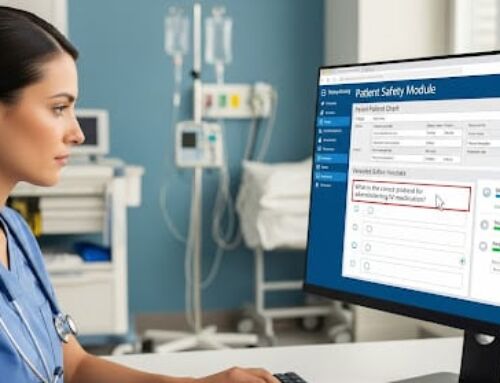
The ability to transfer protected health information (PHI) is crucial to providing quality care and saving healthcare costs. There are several advantages to health information exchange, such as involving the right specialists in a patient’s treatment. However, it’s also crucial to understand the drawbacks, including potential privacy concerns, which constitute an ongoing challenge in healthcare. This article answers the question, “What is health information exchange?” and provides strategies for safe information sharing in healthcare contexts.
What Is Health Information Exchange?
When organizations engage in health information exchange, they allow doctors, pharmacists, nurses, and other providers to share essential patient data, such as vitals, diagnoses, and treatments. For example, if a patient tests positive for a specific condition during a routine check-up, the primary doctor would send that information to the patient’s specialist, who can quickly begin treating that condition.
Increasingly, more healthcare entities are realizing the advantages of health information exchange. The reasons to engage in information sharing include:
- Eliminating unnecessary or redundant testing
- Proving doctors with more decision-making tools
- Increasing healthcare monitoring and reporting
- Reducing excess paperwork
- Lowering treatment and medication mistakes
- Involving patients and healthcare consumers in their decision-making
- Decreasing healthcare costs
- Improving patient outcomes and care quality
On the other hand, there are disadvantages of health information exchange. For instance, threats to patient data privacy are ever-present, sometimes due to inconsistent cybersecurity procedures across entities. Matching patients with their IDs can also be problematic when people with similar names live in the same area. Some records going through health information exchange miss crucial information, making healthcare delivery more challenging and less efficient.
The Health Insurance Portability and Accountability Act (HIPAA) addresses these challenges. The HIPAA Security Rule requires healthcare entities to have policies and procedures to safeguard PHI and patient privacy and prevent unauthorized access to and disclosure of sensitive data in written and digital form. Organizations must employ three types of protections:
- Physical: Safe storage of paper and electronic records, proper disposal and handling procedures, locks and alarm systems to signal unauthorized access
- Technical: Password protection, data and message encryption, user authentication
- Administrative: Employee compliance training, risk assessment, incident response plans
Tips for Secure Health Information Exchange
In complying with HIPAA regulations regarding patient privacy, your organization can take several steps to facilitate health information exchange:
- Implement access controls like password protection, user authentication, firewalls, and data encryption
- Secure physical documents by storing them in locked cabinets in safe locations, and never leave documents with PHI unattended
- Properly shred or dispose of documents you no longer need
- Get written informed consent from patients when obtaining their authorization to share information
- Encrypt all computers and mobile devices containing PHI
- Create physical and digital backups of all patient data
- Develop a plan to respond to cyberattacks or natural disasters compromising data security
- Protect your cyber infrastructure by keeping all antivirus software updated
- Include proper PHI handling in all employee compliance training modules
Compliance Software Can Safeguard Health Information Exchange
Invest in software that can help you manage all your compliance activities, including protecting the PHI that you share with other individuals and entities. With software from Compliancy Group, you can use templates to create procedural documents for storing, transferring, and disposing of sensitive information. Our software also provides comprehensive training on the HIPAA Security Rule and other crucial regulations.
At Compliancy Group, we can help your organization leverage the advantages and overcome the disadvantages of health information exchange. Contact us today to learn how our compliance software and other resources can help you make the most of healthcare information exchange.









